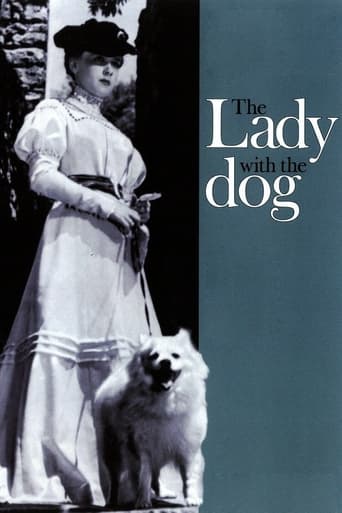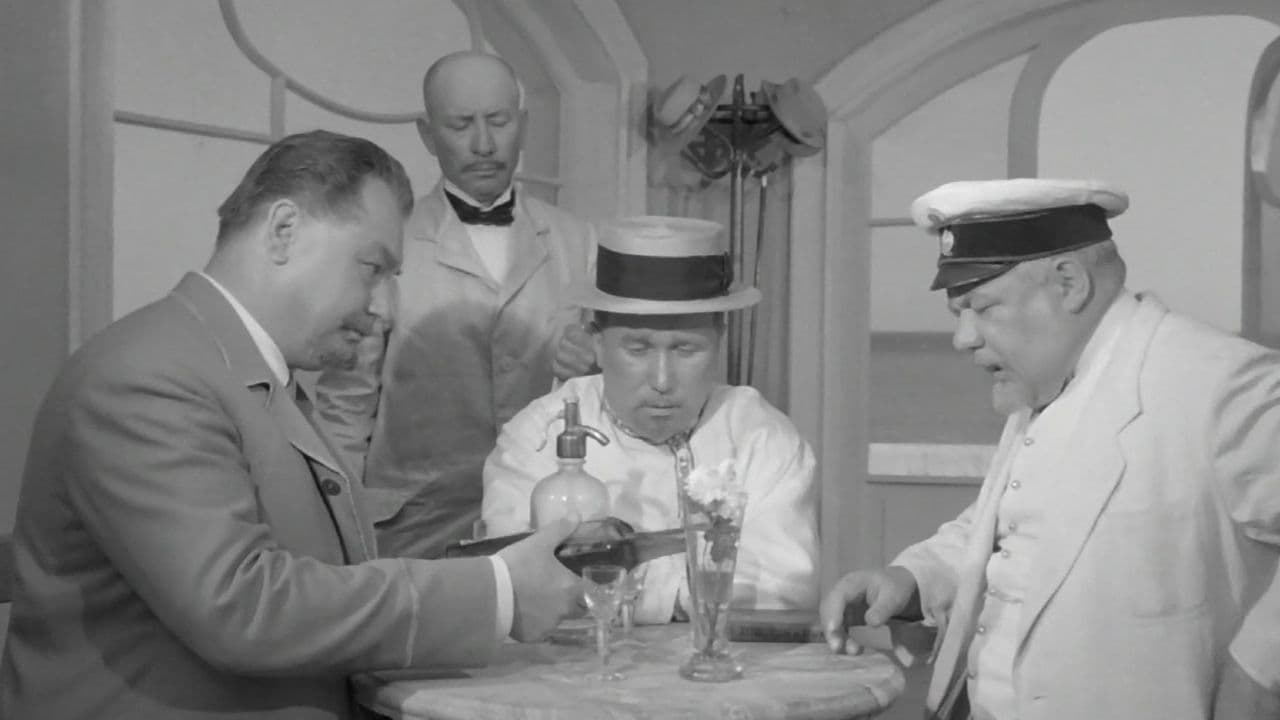hte-trasme
Iosif Kheifits and Lenfilm did an excellent job filming this adaptation of Anton Chekhov's timeless novella. To start with an intangible, this film does what very few adaptations really do, and seems really to capture the feel of the original story of unachievable love -- and to be as ethereally moving. It does it, at least in part, with honesty, simplicity, and great are and attention to detail (in everything from the composition of even the briefest shots, to the old pre-Revolutionary Russian spelling on every visible sign). That simplicity might be its greatest asset, as the story is allowed to take its time to develop, atmosphere and the communication of the characters's emotions taking precedence over a complicated plot or busy action. Both lead actors deserve a lot of commendation, especially Aleksey Batalov, with just the right amount of expressiveness behind his reserve, and exuding a melancholy and desire that perfectly match the tenor of the piece. In all, with its delicate recreation of Chekhov's tone, rich simplicity, and resistance to the temptation to add beyond its material, I have to think of it as one of the best adaptations I have seen.
steve-1338
I admired the fact that the director paid such close attention to local detail that he included several scenes to point out the Moslem presence in Yalta (some 20% of the people are Tartars). There is a scene in which two touristy looking males order drinks in the hotel and then stick a pinkie into their glasses. This is a custom among westernized Turks who wish to follow the Koran's admonition that "the first drop of alcohol shall not pass your lips." So the first drop is removed. Then the coachman does his prayers while waiting for the lovers. And a mother is shown wearing a birka as the children are drilled in their Russian declensions. My fedora is tipped for him.
tintin-23
The "Lady with the Little Dog" is arguably Chekhov's best short story, and probably one of the greatest short stories ever written. I realize this is quite a statement to make, but, notwithstanding my opinion, it has been also the opinion of countless literary critics since the publication of the story. The challenge to faithfully render it on the screen was indeed a daunting task, but Heifitz, sure of himself, went ahead with the adaptation of "The Lady with the Little Dog," an intimidating task, and succeeded. Of course, it did not hurt that Heifitz had been a great admirer of Chekhov's work since his childhood, and considered him his mentor. And of course, nobody without a "velikaya russkaya dusha," a great Russian soul, could have rendered this work. To a Russian, his soul is something more than what a Westerner drags to church on Sundays and holidays. It is hard to explain the Russian soul, but as they say, I cannot tell you what it is but I know it when I see it.Andrei Moskvin and Dmitry Meskhiyev's black and white photography is exquisite in rendering the atmosphere of the film, starting in its opening with the lethargic atmosphere of Yalta, the snowy Moscow winter, or the pathetic, frozen atmosphere of its conclusion. Heitfitz' succeeds at reproducing Chekhov's style and symbols. As rapid cuttings distinguish the story's narrative technique, the camera often jumps to new scenes without warning. These cuts and jumps through time give a sense of the suddenness and unexpectedness of Anna and Gurov's illicit love affair, their falling in love, their settling into their new life, where much has to be improvised to maintain the relationship. Nature and the sea are important symbols in Chekhov's work and are portrayed in the film through lyrical long shots of the sea at sunset and the nearby hills at Yalta. The two protagonists sit silently, reflecting from their vantage point on the birth of their love affair, lost in the continuum of eternity."
Yes, when you stop to think, the whole world is wonderful -- everything, except what we ourselves think and do when we forget the higher aims of existence and our human dignity" says Gurov.Heitfitz uses a variety of shots appropriate for each scene. Close shots and close ups emphasize the moments of psychological drama. The dialogue is, as in Chekhov, minimal, and never more than is necessary. Only few words convey the emotional complexity of the characters, preserving the intensity of their feelings.As with Chekhov, the Yalta seduction scene in Anna's room, or any of the intimate scenes later on, is not shown. In that respect, Chekhov/Heifitz followed the Russian mores of the time, knowing full well that had Chekhov dared to innovate, it would have never passed the censor's pen. One also notes the great care taken with the period details, such as costumes, carriages, and the physiognomy of the actors.The acting of the two main characters, Iya Savvina and Aleksei Batalov, is "on the mark." She is young, fragile, and innocent, and he, reserved, sophisticated, and aristocratic. Anna was Savvina's first role. She went on to appear in twenty-seven more films, her last one, Trotsky, in 1993. Batalov has appeared in more than thirty-four films, including "Moscow Does Not Believe in Tears" (1979). The other two lesser characters appear only briefly: Nina Alisova, as Gurov's wife is sullen, and Pantelejmon Krymov in the role of Anna's husband, indeed looks like a "lackey." The lyrical music by Nadezhda Simonian, like the dialogue, is used relatively sparingly. A romantic love theme appears throughout the film with different tempi, underscoring the different situations, and in several scene transitions.The themes of this film are love, and the Russian society in the late 19th century. "The Lady with the Little Dog" is a love story between two people who started in life on the wrong footing, for whatever reasons, as most of us do. To understand the story, we have to speculate as to what had happened to these two characters before the story opens. She is an aristocratic Russian woman, and thus was destined to marry, for love if she was lucky, but most likely without love, just to fulfill her role in society, to raise a family and be the centerpiece of that family. So, Anna followed her destiny. Gurov is an older aristocrat, from the big city, a well-established member of the Moscovite society, married with children. He is a man, and therefore in (relative) control of his life, and as a man of his time, looks down on women, but at the same time, enjoys their companionship. For that epoch, at forty years of age, he is at the twilight of his womanizing years.Anna and Gurov meet and start an intimate relationship, each for a different reason. Anna wants to escape her boring, dreary small town provincial life. To Gurov, Anna may represent one of his last chances, if not the very last, to seduce a young woman who will rejuvenate him, invigorate his life. His life is turned upside down, as the seducer is himself seduced, hoisted upon his own petard. But love does not rescue Anna and Gurov from their stale marriages, nor does it improve their lives. Of course, divorce at that time and in that society was totally out of the question. At the end of the film, nothing is said about their future. It would seem that their relationship may continue, with their occasional assignations in seedy hotels, a couple caught "
like a pair of birds of passage. They've been caught and forced into separate cages." (Anna). Neither of them is brave or strong enough to fly free, "It seemed that in a little while a solution would offer itself, a new, lovely life would begin." (Gurov) This short story, which Heifitz rendered flawlessly on the screen, is among Chekhov's most poignant and lyrical.
biggadada
I must have seen this film when it first came out because it seems so long ago now, but it made a great impression on me,especially the theme music and the tune played by the street musician on a clarinet I believe. I am so pleased to have traced the details at last courtesey of the web. I wonder if there is a chance I will ever see it once more.


 AD
AD
